Marikana, Bangladesh, Bahrain & Brazil – 2018. One of the joys of London is its multi-cultural nature with so many people from different countries and nationalities working here and many for various reasons choosing to make a new life in the city, and the four protests I photographed on Monday 13th August 2018 reflected that diversity.
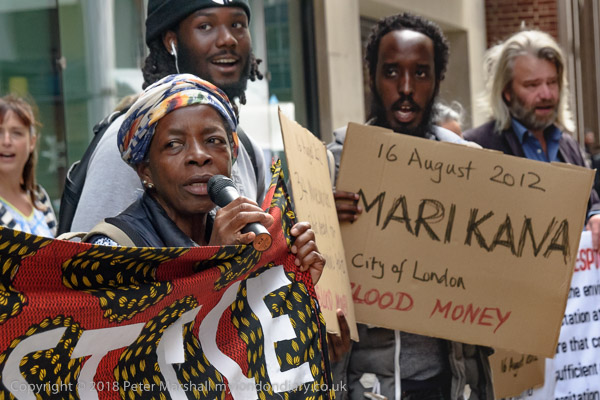
London has long been a cosmopolitan place, and has a long history of welcoming people fleeing from persecution and oppression, certainly from the days of the Huguenots and in the late nineteenth century the Jews fleeing pogroms in Eastern Europe. London has also memorials to a number of the liberators of South America who were given refuge here, as well as European revolutionaries such as Karl Marx and Giuseppe Mazzini.
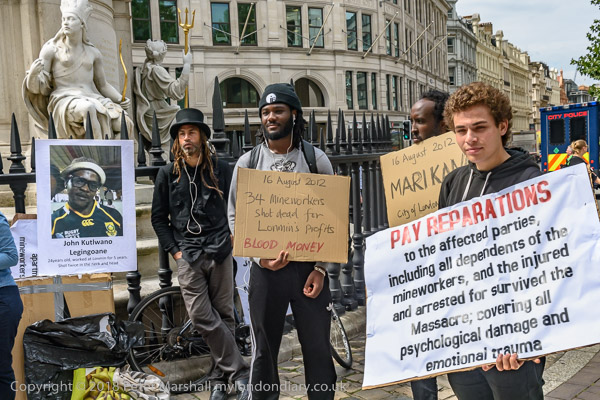
In the twentieth century things began to change, beginning with the Aliens Act 1905 which was aimed at denying entry to ‘undesirable’ Jewish and Eastern European immigrants. But subjects of the British Empire still had free movement, though restrictions were tightened up against those from South Asia after the First World War.
After the Second World War we needed immigrant workers to run public services but also began to set up tight barriers against immigration from the Commonwealth. In the current century we have clearly racist anti-immigrant policies and now even plans to forcibly deport asylum seekers to Rwanda.
There are now many different national communities living in London, often gathered mainly in particular areas of the city. And from these are many groups still highly concerned about events in their countries including some who have come here as political refugees. Often their concerns are shared with others on the left in the UK who come to protest with them.
Justice For Marikana – 6th Anniversary – City of London
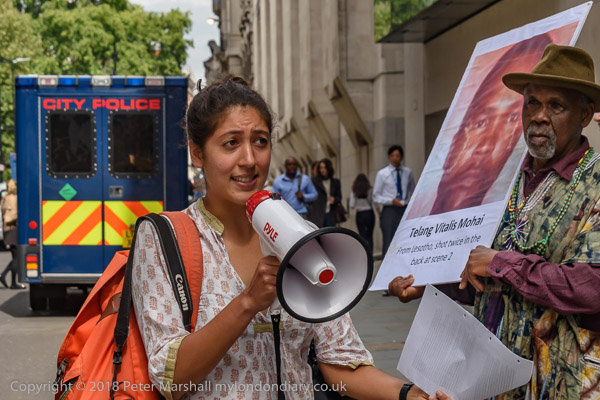
South Africa was once a key part of the British Empire, and its mines in particular contributed greatly to the wealth of London and many mining companies are still based in the city. The earliest demonstrations I attended were against British companies and the UK government who supported Apartheid and these and the boycott continued for many years.
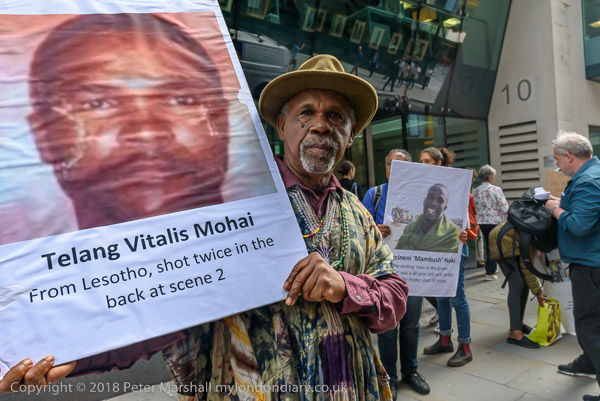
34 Striking miners were shot dead by South African police at Lonmin’s Marikana platinum mine in 2012, and three days before the 6th anniversary of the massacre the Marikana Solidarity Collective organised a tour of the City of London protesting outside the premises of investors, insurers and major shareholders profiting from the violence against people and nature in Marikana.
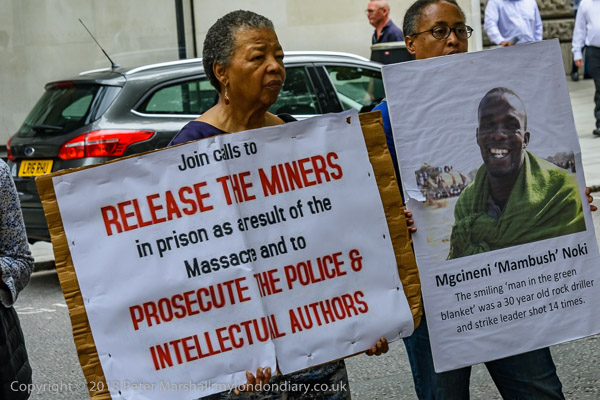
Lonmin plc was founded in London in 1909 as The London and Rhodesian Mining and Land Company Limited and became a huge company. As well as mines the company diversified its interests and for 12 years from 1981-93 was the owner of the Observer newspaper. Even Prime Minister Edward Heath described the company, then notorious as Lonrho, in 1973 as “an unpleasant and unacceptable face of capitalism” for its busting of sanctions against Rhodesia.
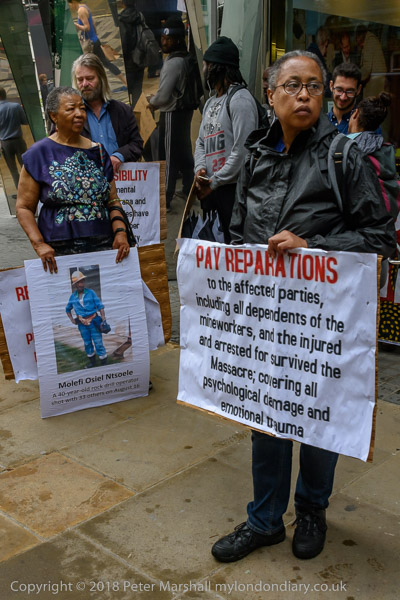
The protesters carried banners and large portraits of some of the murdered miners. They met up at St Paul’s Cathedral and then left to march to the offices of several investors, insurers and shareholders profiting from the violence at Marikana, calling for those responsible to be brought to justice and for reparations to be made to their dependents and to those survivors who were injured and arrested. The tour ended outside the London offices of BASF who are the major customers for the platinum mined at Marikana.
Justice For Marikana – 6th Anniversary
Release Bangladeshi opposition leader Khaleda Zia -Downing St
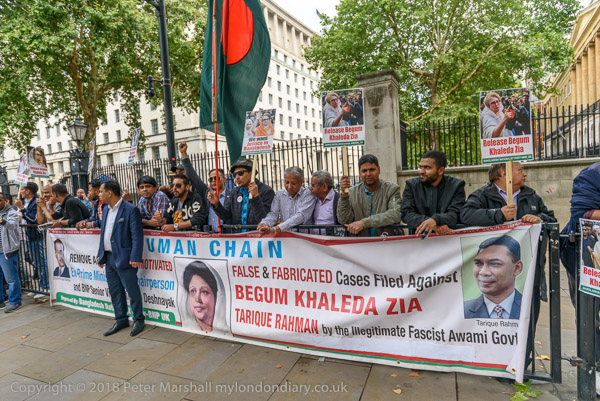
The Bangladeshi Nationalist Party UK protested opposite Downing St for the release of their party leader, Begum Khaleda Zia, jailed in February for five years for embezzlement of international funds donated to Zia Orphanage Trust.
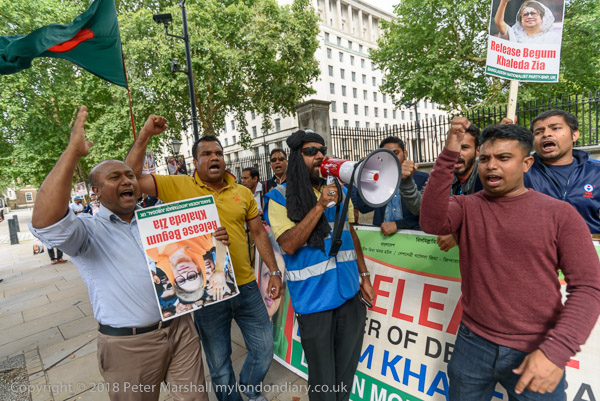
Khaleda Zia was the First Lady of Bangladesh during the presidency of her husband Ziaur Rahman who founded the Bangladesh Nationalist Party (BNP) in the late 1970s, was Bangladesh’s first female head of government from 1991-6 after the BNP won the country’s first democratic election in 20 years, and served as prime minister later in 2001-6.
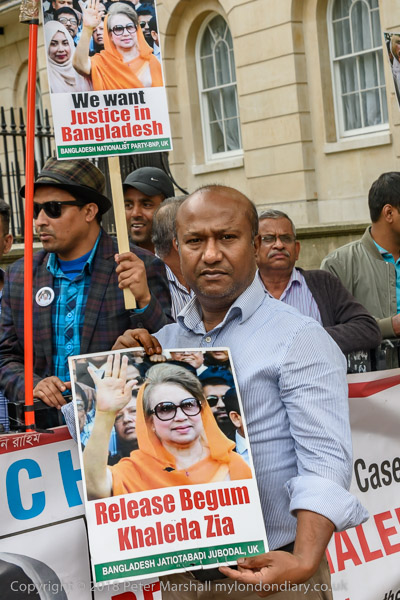
The BNP claim the charge against her was politically motivated. Her son has also been sentenced to 10 years in jail but remains in London. Some Bangladeshi friends say there is little to chose between Zia and her rival, Sheikh Hasina Wazed, leader of the Awami League and Prime Minister of Bangladesh since January 2009. They say both are corrupt and neither represents the interests of the people of their country.
Release Bangladeshi opposition leader
Attack on Bahrain Embassy hunger striker – Bahrain Embassy, Belgrave Sq
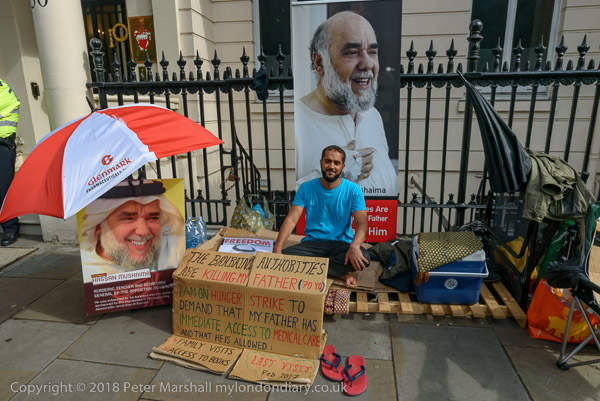
Inminds Islamic human rights organisation protested outside the Bahrain embassy after an attack in the early hours of the previous morning on hunger striker Ali Mushaima who was on hunger strike there since the start of August to save the life of his father Hassan Mushaima, one of the leaders of the 2011 mass movement that peacefully called for human rights and democratic reforms in Bahrain.
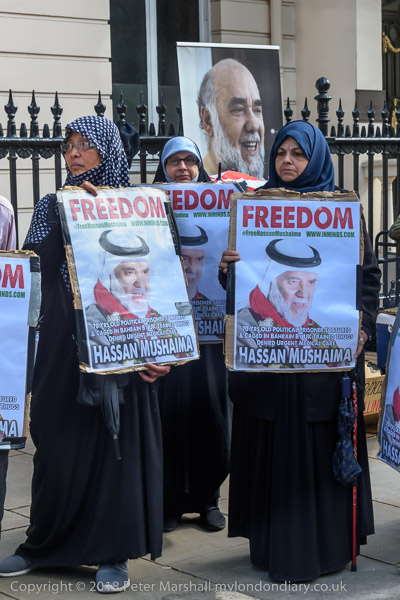
Inminds had protested in support of the Ali Mushima three days earlier, calling for the release of his father and all the other 5000 Bahraini prisoners of conscience languishing in the Al-Khalifa regimes jails and for and end of the dictatorship’s crimes against the Bahraini people.
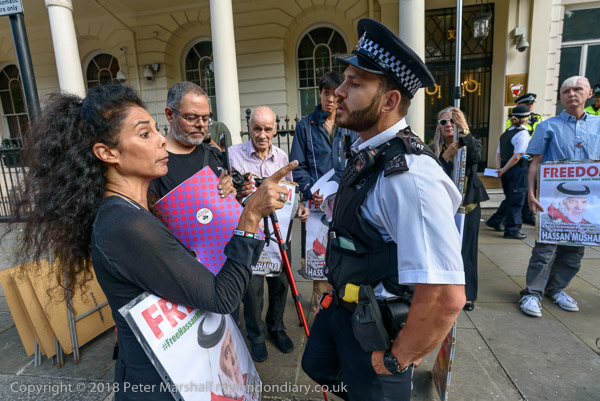
Police had failed to properly investigate the early morning attack when a bucket of an unknown liquid was thrown over the hunger striker on the pavement below from the Ambassador’s balcony, but came to harass the protesters, trying to prevent them protesting in front of the balcony.
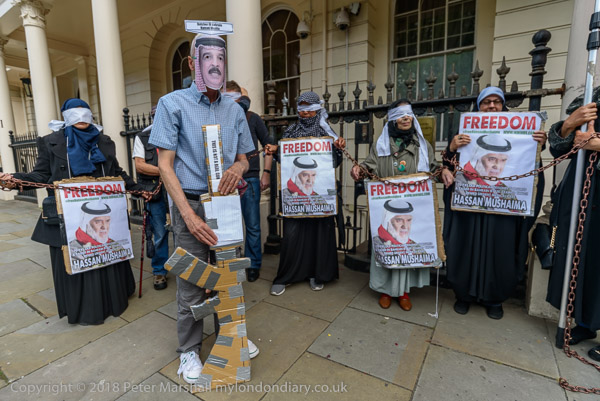
The protesters refused to move and then performed a rather unrehearsed short play in which Theresa May sold arms to the Bahraini dictator which he used to shoot protesters, who were then chained up. Unlike in real life the International Criminal Court came to their rescue, released them and condemned the Bahraini regime for their crimes against humanity.
Attack on Bahrain Embassy hunger striker
Free Lula – Brazilians for Democracy & Justice – Brazilian Embassy, Cockspur St, St. James’s

Brazilians protested outside the Brazilian embassy calling for the release of Lula – Luiz Inacio Lula da Silva – the former trade union leader who was President of Brazil from 2003-11 in order to enable him to stand for election again in October 2018.
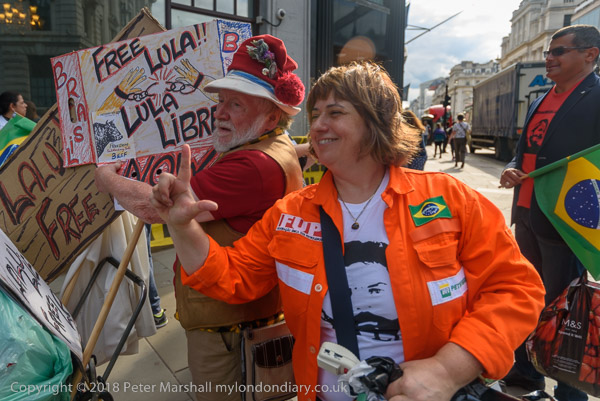
The right-wing Brazilian government had brought highly dubious charges against both then President Dilma Rousseff and Lula to impeach Dilma in 2016 for what was not an impeachable offence and to send Lula to prison in an attempt to prevent the Worker’s Party (TP) winning in the forthcoming elections.
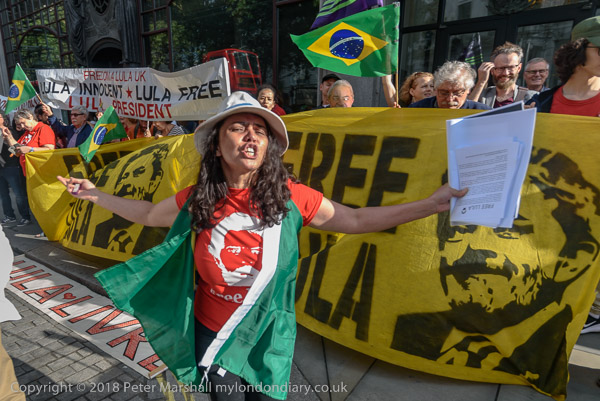
Unfortunately he was not able to stand in 2018, and the far-right Bolsonaro became President. But Lula was released pending appeal in November 2019 and in March 2021 the Brazil Supreme Court ruled the judge in his trial was biased and the following month restored his political rights and all his convictions were nullified. He is now the front runner for the 2022 presidential elections.